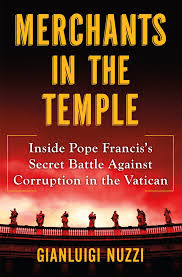
This article is a preview from the Spring 2016 edition of New Humanist. You can find out more and subscribe here.
Merchants in the Temple (Henry Holt) by Gianluigi Nuzzi
The Vatican is administered entirely by princes of the Church and ruled over by the Pontiff – Europe’s last absolute monarchy, with the possible exception of Liechtenstein. Only the most naïve can have thought it to be the epitome of charity and good governance.
Gianluigi Nuzzi’s book Merchants in the Temple, however, makes a convincing case that the Vatican may well be among the most corrupt states in the world. The corruption is so ingrained and all-encompassing that the state may well be ungovernable. Auditors’ reports have highlighted these problems for decades, but any attempts at reform have been totally ineffective. So serious are these problems, it has even been suggested that the Vatican is on the edge of bankruptcy, partly because of a massive deficit in its pension fund.
Pope Francis and his aides have started to propose solutions that are essentially secularist: the separation of church and state, with non-clerical specialists being appointed to head seven of 15 key departments, in the place of cardinals. But despite years of effort, there is no implementation on any front, and resistance from vested interests at every turn.
Does it matter? Is it anyone else’s business? In many respects, not. In any case, it seems implausible that the almost untold wealth of the Church outside the Vatican cannot be channelled to ameliorate problems there. In central Paris, for instance, there remain vast buildings that served as headquarters of religious orders that have to all intents and purposes become defunct. The buildings are therefore surplus to requirements.
The Vatican’s Achilles heel is money laundering, which the European Union takes very seriously, although whether even it has the stomach for tackling it resolutely in the Vatican is not clear. Attempts are being made to close at least some of the Vatican bank accounts belonging to those who do not have a legitimate reason to hold one. But Nuzzi’s book is peppered with revelations of other deep-seated problems that need solving before money laundering can be eliminated.
These include the revelation that 1.4 billion euros had not been entered into the Vatican’s balance sheets, one of numerous such findings. What appear to be off-the-books slush funds are duplicitously passed off as sums held back for a rainy day. Asset inventories are hopelessly incomplete, invoices are padded, and hugely inflated prices are paid for works done. There are no competitive tenders, and lucrative work is given to a few favoured companies. In 2012, only about 20 per cent of the €53m of “Peter’s Pence” raised by churches for the poor actually reached them. There are no official accounts of the whereabouts of these missing millions – Nuzzi’s assertion is that most of it goes to the bloated curia.
Reference is also made to “massive tax evasion”, arising from little-known “personal exemption from sales tax” and from certificates and properties being inappropriately classified as “for the needs of worship”, both presumably impoverishing the exchequer of Italy, at least.
Pope Francis chose the Australian Cardinal Pell as his leading aide to begin tackling these problems. It is revealing, chilling even, that the Pontiff was willing to look past controversies over institutional child abuse in the Australian Church (prompting a Royal Commission in 2013), and allegations against Pell in particular.
Over the years the Vatican has harboured a number of senior figures who have been parachuted back to the Vatican after such notoriety. It has recently demonstrated again its disinclination to extradite its notorious citizens – for example the former Nuncio of the Dominican Republic – to face criminal charges elsewhere, something Pell may find reassuring. Pell reportedly once suggested that the Church should have no more liability for the misdeeds of its clergy with minors than should the owner of a truck whose driver had similarly behaved.
It therefore looks as if there is no hope for any let-up in the Vatican’s shameless hard-ball approach of paying victims and shielding perpetrators. This has continued despite stark criticism from the UN Committee on the Rights of the Child.
Was there no one else in the world that Francis could have appointed for this primarily administrative challenge? Presumably he wanted someone with clerical credentials who had demonstrated they were oblivious to criticism. A cursory examination of the Australian media – hugely critical of Pell – will testify that he meets these criteria.
Merchants in the Temple opens with a stark reminder that John Paul I was found dead in 1978, just hours after informing his Secretary of State of his intention to dismiss a tranche of senior cardinals the next day. More recently, Benedict XVI’s pontificate also came to a premature end; he resigned in 2013 after being elected in 2005. Apparently he threw in the towel, but at least he escaped with his life. Tellingly, experts in organised crime have expressed concerns about Francis’s safety.
The strain on Francis must be huge. He has made the most spirited attempt at reform in recent times, spending a fortune in consultancy fees and surrounding himself with loyalists. Vatican organisation and administration should only be a small part of the Pope’s responsibilities, but it appears to have taken up a huge amount of his time. He has already hinted he might retire too, and there have been rumours about his health. Will Francis succeed in executing this reform, where others have failed? Nuzzi doesn’t hold out much hope.
Nuzzi’s book reads like a thriller, but it would be far more accessible as a book of reference if there was an index, or at least a table of contents showing chapters and subheadings – preferably both. The wealth of detail, with dates, transcripts and full references, certainly make Nuzzi’s case utterly convincing. Having said that, the finer details sometimes come across as padding: do we need to know the size in square metres of various prelates’ lavish apartments (for which of course they pay derisory rents, if they pay at all), or how many account holders exceeded their discount cigarette allowance?
Either way, Nuzzi’s revelations are so stunning they are well worth ploughing through such banal details.

